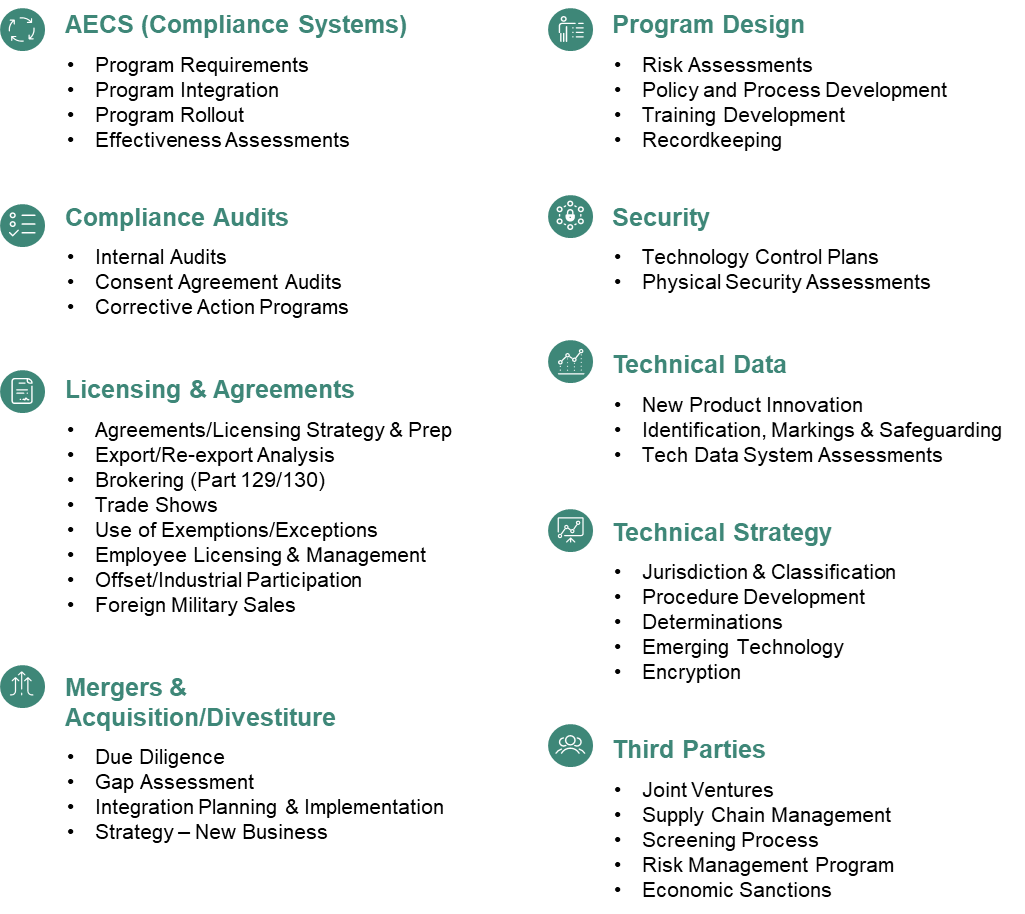Matthew Axelrod, the Assistant Secretary of Commerce for Export Enforcement with the Department of Commerce, recently made two important statements on how the Department will enforce trade controls and address violations. These statements – one at the National Association of College and University Attorneys (NACUA) 2022 Annual Conference – and the second at the 2022 BIS Update Conference on Export Controls and Policy (BIS Update) - messaged the Department’s updated approach to supporting organizations such as universities in complying with trade controls, but also how the Bureau of Industry and Security (BIS) will handle violations going forward.
These announcements merit close review by university and corporate general counsel, chief compliance officers, and global trade leaders, and assessment of how the new policies and enforcement stance impact both the structure of existing compliance programs as well as the approach to potential violations.
Policy Changes
Prevention: In both his NACUA and BIS Update remarks, Assistant Secretary Axelrod emphasized the importance of compliance programs to prevent and detect violations and outlined both the expectations of BIS but also the ways BIS will assist both companies and universities in the creation and improvement of effective compliance programs.
At the BIS Update, Assistant Secretary Axelrod noted that BIS had recently taken several actions to assist companies in preventing and detecting violations.
- Updated “Don’t Let This Happen to You”: BIS recently finished a revision of this important guidance document with numerous examples of what happens when individuals or companies do not comply with export controls regulations.
- Training: Overseas Export Compliance Officers (ECOs) are working with U.S. and international business associations on understanding and complying with recent Russia controls implemented in the wake of the Ukraine invasion. This reflects the deployment of additional ECOs to expand current and planned international partnerships and collaboration.
- New Field Office: Assistant Secretary Axelrod announced that Phoenix will become the ninth full Field Office in light of the region’s growing semiconductor manufacturing presence and role in National Security.
At the earlier NACUA speech, he also announced an “Academic Outreach Initiative” to assist universities in complying with U.S. trade controls. This initiative will consist of four elements, of all which are designed to provide BIS expertise to university compliance leaders:
- Strategically Prioritized Engagement: BIS will prioritize engagement with universities with elevated risk, including those doing Department of Defense (DoD) research, those with ties to foreign universities on the Entity List, or those engaged in sensitive technology research subject to the EAR;
- Assigned “Outreach Agents”: Prioritized universities will have assigned Export Enforcement Agents to serve as Outreach Agents - dedicated points of contact, responsible for long-term partnerships, quarterly meetings, and assistance in prevention of unauthorized exports;
- Background Briefings: Outreach Agents will provide background briefings on known national security risks associated with foreign entities, including foreign university and industry partners that have ties to foreign governments or other foreign actors; and,
- Trainings: Outreach Agents will provide hands-on training to assist universities in vetting potential partners to determine connections with those on the Entity List, application of export controls in academic settings, and establishment of tailored Export Management Compliance Program (EMCP).
He encouraged universities to develop an EMCP and indicated that the Office of Exporter Services is available to assist in the creation and implementation of tailored EMCPs. Importantly, he noted some of the core elements of an effective EMCP for research universities. These include:

Noting the distinction between fundamental research and proprietary research (considered confidential from a business or national security perspective), he also encouraged research universities to build a “sophisticated understanding of the EAR” and understanding of how its rules apply to professors, students, staff, and visitors. Additionally, he warned research universities, frequently at the forefront of emerging technology, to be aware of how authoritarian regimes use emerging technologies such as artificial intelligence, to monitor, track, and surveil dissidents.
Enforcement: Assistant Secretary Axelrod also made several important announcements on enforcement at the BIS Update. He first noted that commencing on June 2, the Office of Export Enforcement will make charging letters public when filed with an Administrative Law Judge, rather than upon resolution. While pre-charging letters may still be used to facilitate conversations and negotiations, BIS wants to provide early notice to the broader public to create awareness of what violations have occurred and incentivize timely upgrades to compliance programs and submissions of voluntary disclosures. In addition, he announced four additional enforcement changes, all of which seek to focus enforcement resources on the most serious violations:
- Commensurate Penalties: Assistant Secretary Axelrod stated: “[W]e will use all of our existing regulatory and statutory authorities to ensure that the most serious administrative violations trigger commensurately serious penalties.” When a competitor flouts the rules to gain an economic advantage, BIS will aggressively impose penalties to create a level playing field and deter other entities considering circumvention.
- End of “No Admit, No Deny” Settlements: BIS wants companies and industry to learn from other entities. While BIS will still give a settling party significant credit, it must admit that the underlying factual conduct occurred to ensure others have a clear sense of what happened and can take preventative measures.
- Non-Monetary Penalties: When violations do not implicate a serious national security harm – but are more serious than cases warranting a warning letter or no-action letter, BIS will offer settlement agreements without monetary penalties. The focus in these settlement agreements will be remediation in the form of a suspended denial order with certain conditions such as training or other compliance program requirements.
- Voluntary Self-Disclosures: Minor or technical infractions will be resolved on a “fast track” with a warning letter or no-action letter within 60 days of the final disclosure. Those self-disclosures involving potentially more serious violations will receive a robust review, including assignment to a Special Agent and an OCC attorney, to determine enforcement actions. In the most serious cases, the Department of Justice’s (DoJ) Counterintelligence and Export Controls section will assign an attorney as well. BIS also reminded organizations of the independent duty to submit voluntary disclosures to DoJ in appropriate cases.
In both speeches, the Assistant Secretary emphasized the heightened focus on both Russia and China. At the BIS Update, he described the range of recent enforcement actions taken, including the June 7, 2022 Temporary Denial Order against three companies that contracted with U.S. companies to 3-D print items for sensitive prototype space and defense technologies, and then sent the blueprints and drawings received to China without the license for 3-D printing and return to the U.S.
Ankura Capabilities
Ankura’s international trade controls team combines the perspectives of former in-house counsel and compliance professionals, management compliance professionals, former law firm attorneys, and engineers. Our approach is driven by both an understanding of regulator expectations, and awareness and experience of how organizations require practical and realistic solutions to meet both regulatory requirements and business challenges.
Ankura offers clients as well as their external counsel a range of services to address key challenges for export compliance leaders. Regardless of the specific ask, Ankura’s professionals develop tailored, sustainable, and business-oriented solutions aimed at withstanding regulator scrutiny and adding value to the business. Our team’s unparalleled experience as company trade practitioners and leaders facing tough trade compliance challenges, positions us to assist clients in implementing practical, effective solutions.

About the Authors
Alan Levesque
Alan Levesque is a Senior Managing Director at Ankura based in Washington, DC. Alan has over 30 years of experience as a senior C-suite executive, practicing litigation attorney, in-house legal counsel, and compliance professional. He has led cross-functional teams in multiple global organizations and across sectors to develop, implement, and sustain practical solutions to the most pressing corporate legal and compliance problems. Alan brings a broad perspective and diverse skillset to solve serious regulatory issues across a wide spectrum of compliance matters. Alan assists clients of all sizes and industries both to address discrete issues and to complement the client’s overall compliance posture long-term.
Joseph M. Moyer
Joseph M. Moyer is a Senior Director at Ankura based in Washington, DC. He has over a decade of experience as an attorney and management consultant focused on assisting clients with a range of compliance, investigative, and risk management challenges. A seasoned leader of global teams, his work has spanned multiple continents. A former Navy Judge Advocate, Joseph today focuses on assisting clients with navigating national security implications of foreign investment and trade, including Committee on Foreign Investment in the United States (CFIUS), Foreign Oversight, Control, and Influence (FOCI), and Team Telecom reviews. He has worked on multiple CFIUS monitorships, audits, and advisory engagements to ensure sustained client compliance with terms of National Security Agreements (NSAs).

Copyright 2022. The views expressed herein are those of the author(s) and not necessarily the views of Ankura Consulting Group, LLC., its management, its subsidiaries, its affiliates, or its other professionals. Ankura is not a law firm and cannot provide legal advice.



